4 Jul, 2022
Are you embarking on a construction project for your new home and thinking about the heating system you want to use? Have you considered a hydronic floor heating system? Unlike other processes that work by circulation or convection, it spreads heat by radiation. In addition to being a reliable and economical choice, your feet will always be warm.
Here's everything you need to know about its planning and installation!
This kind of system uses pipes installed underneath the poured concrete. The heat generated comes from water or a water/glycol mixture that circulates in the floor. This heat can be supplied by several energy sources, such as electricity, heat pump, gas, geothermal or solar energy. But what is the real difference between the two types of fluids offered?
Water-based hydronic flooring is slightly less expensive than glycol-based flooring. It’s also a better thermal conductor. However, this hot water system can only be used in a well-insulated home to avoid the risk of breakage due to cold.
Glycol-fed hydronic flooring is the ideal solution to prevent corrosion and freezing of pipes. Even on the coldest days 一 as numerous as they are in Quebec 一, you won't have to worry about the system breaking down. Despite the slightly higher price, this option is interesting for places with little to no insulation, such as parking lots and garages.

The idea of hydronic floor heating caught your interest? Here is the impact on your budget, its ecological footprint and its utility.
For the purchase of this particular system, you will need to budget more than for electric baseboard heaters. However, hydronic floor heating systems are a good long-term investment. Depending on the choice of energy sources, you can save up to 40%! This is especially true for heat pumps, which also provide air conditioning.
As mentioned above, there are several power sources that can heat the fluid circulating in the pipes. Geothermal energy is an interesting option if you want to be conscious of the environment. Drawing its energy directly from the ground, this process will allow you to reduce your ecological footprint. Interested in this alternative? Learn more about the standards for a more ecological practice.
A hydronic system is perfect for subtle and versatile heating. Unlike electric systems, all floor coverings can be installed: hardwood, floating floor, ceramic, etc. You will have no limitations regarding your interior design.

Of course, a hydronic heating system requires extensive planning and specific installation steps. Here is the procedure to follow to obtain a finished product that meets your expectations…
First, the installation of the pipes must respect certain standards according to the distance and depth in the ground. For basement installations, experts recommend a distance of 12" between pipes and 4" of concrete thickness. For the first floor, 6" between pipes is suggested and 1,5" of concrete thickness (which is why hydronic floor heating is mostly used for a new construction).
Then, you will also need to hire an electrician to connect the electric kettle, or a gas specialist if you have chosen a gas kettle. Finally, the installers will set in place the thermal insulation and mesh. They will then install the tubing at the recommended distance before pouring the concrete.

Did you know that you can also assemble your floor heating system on your own? Luckily for you, HCWs’ hydronic radiant floor systems offer this alternative. We take care of assembling most of the work and provide you with installation videos. Therefore, you will be able to install your floor heating system by yourself. If this option interests you, take a look at our installation guide.
You now know everything there is to know on the hydronic floor heating system. With a price equivalent to an electric floor heating system, the hydronic option allows you to save money in the long run. Its eco-friendliness and versatility make it the ideal solution for comfortable, unobtrusive heat.
Before you make your final decision, you want to know which floor heating system suits your needs? Take a look at the ABC's of floor heating systems to see how they compare.